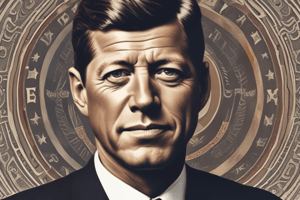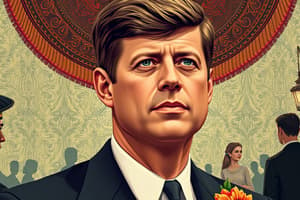Podcast
Questions and Answers
What does President von Weizsacker assert remains open as long as the Berlin Wall stands?
What does President von Weizsacker assert remains open as long as the Berlin Wall stands?
- The German question alone
- The economic backwardness of the Communist world
- The Soviet's plans for Berlin
- The question of freedom for all mankind (correct)
What does the speech contrast the devastation of post-war Berlin with?
What does the speech contrast the devastation of post-war Berlin with?
- The token gestures of reform and openness from Moscow
- The industrial output and cultural richness of West Berlin (correct)
- The oppression and lack of freedom in East Berlin
- The failure and technological backwardness of the Communist world
What aspect of Berliner spirit is credited for defying Soviet plans?
What aspect of Berliner spirit is credited for defying Soviet plans?
- Berliner herz (heart), Berliner humor, and Berliner Schnauze (dialect) (correct)
- The resistance to Communist oppression and lack of freedom
- The abundance of food, clothing and automobiles on the Ku'damm
- The rebuilding of West Berlin's industry and culture
What does the speech claim the Soviets failed to predict in the 1950s?
What does the speech claim the Soviets failed to predict in the 1950s?
According to the speech, what conclusion stands before the world after four decades?
According to the speech, what conclusion stands before the world after four decades?
What does the speech question about Moscow's new policies of reform and openness?
What does the speech question about Moscow's new policies of reform and openness?
What is the main purpose of the speaker's address?
What is the main purpose of the speaker's address?
According to the speaker, what does the Wall represent?
According to the speaker, what does the Wall represent?
What does the speaker mean by the phrase 'Es gibt nur ein Berlin'?
What does the speaker mean by the phrase 'Es gibt nur ein Berlin'?
How does the speaker describe the restrictions on movement in Eastern Europe?
How does the speaker describe the restrictions on movement in Eastern Europe?
What image does the speaker use to emphasize the division of Berlin?
What image does the speaker use to emphasize the division of Berlin?
What does the speaker mean by the phrase 'every man is a Berliner'?
What does the speaker mean by the phrase 'every man is a Berliner'?
Flashcards are hidden until you start studying




